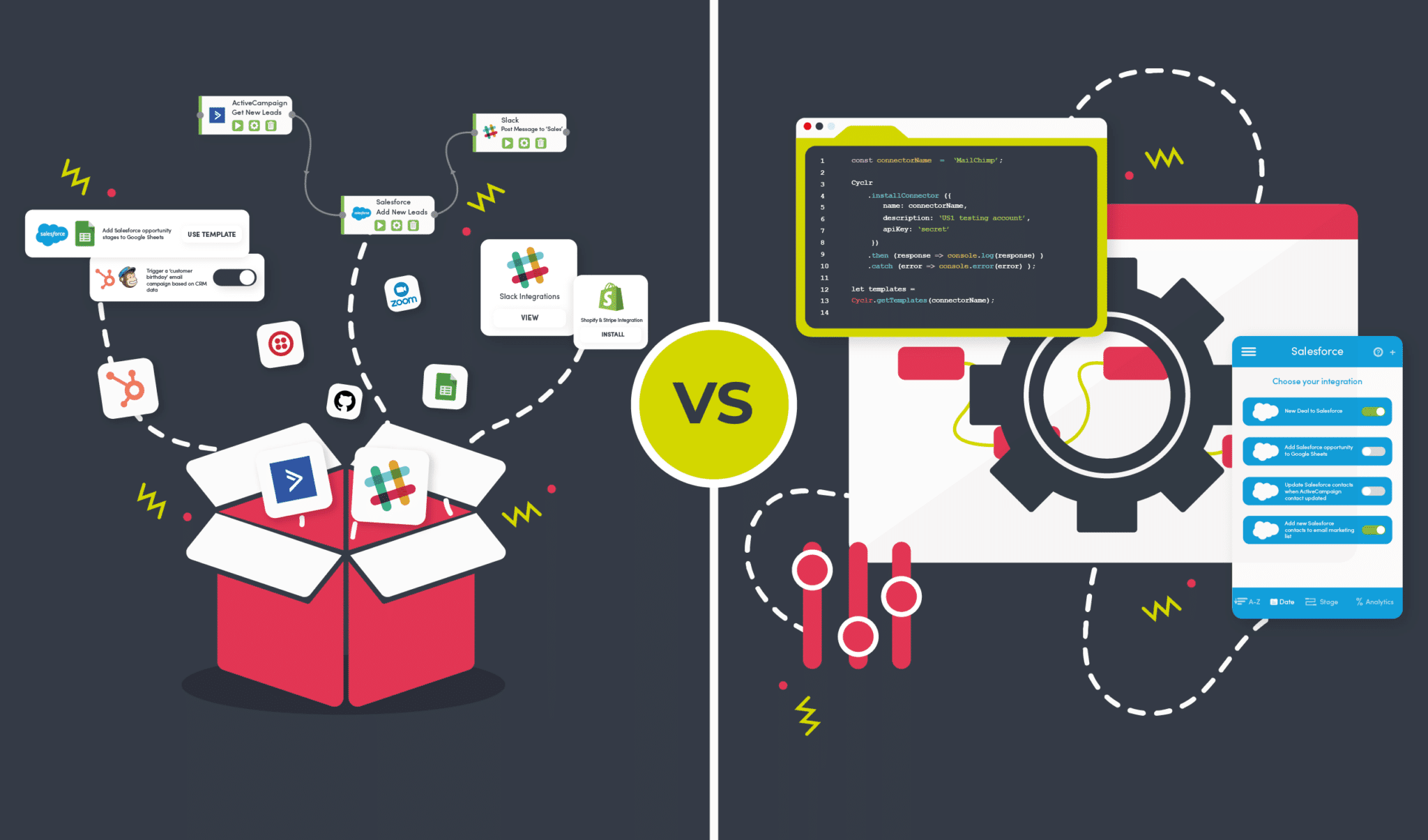
Software comes in many different shapes, and sizes and is used in different ways across varying industries. A widely used application with out-of-the-box features works well in the retail industry, but for the education sector, additional customisation may be required.
This leads to applications being designed and built for specific industries. For instance, the education sector would prefer to use a vertical SaaS application as it is more tailored to their use case than a widely used horizontal SaaS. It may have a wider audience but less relevance to their specific needs or use case.
That brings us to question what is out of the box and custom software, or more specifically out of the box integrations and custom integrations.
Out of the Box Integrations
First off, out-of-the-box or also known as off-the-shelf software refers to prepackaged software. It handles standard processes for a specific type of company with native features and built-in functionality directly from the vendor. The product or feature works immediately when used.
For example, an embedded iPaaS has a library of pre-built API connectors. These connectors are ready to be used and implemented in integrations straight out of the box. The API connectors are built with a range of actional methods to extract, collate and process data.
In addition, the embedded iPaaS has pre-built integration templates. Again these allow users to implement automated workflows straight out the gate.
Out of the Box Integrations: The Benefits
Out-of-the-box integrations provide many benefits to users. For instance, they enable much faster deployment after the software is installed and configured to a user’s specifications. As well as helping to save time and development resources.
Other benefits of off-the-shelf integrations include being budget-friendly by nature. As they are designed for specific functionality at an affordable price. In addition, out-of-the-box integrations are widely available. Businesses in common like vertical or horizontal SaaS organisations don’t struggle to find out-of-the-box integration solutions. This is due to it successfully helping other similar organisations.
Out-of-the-box integration applications also provide support and continuous updates to its widely used solution. This large international user base can benefit from a large knowledge base. As well as forums with additional tips and tricks.
These types of out-of-the-box integration solutions have minimal technical experience required. With applications implementing low code tools to build and amend integration solutions, you won’t need to bother your developer teams.
Out of the Box Integrations: The Challenges
A challenge in working with out-of-the-box solutions is that there can be functionality gaps. Especially if you have unique business processes, it may require some customisation. Out-of-the-box integration solutions may fall short and lack an important workflow feature.
The software may also provide features that go unused or are unnecessary for your specific use case.
Custom Integrations
On the other hand, a custom solution is an original piece of software developed to meet a distinct customer need in other words adding customisation to out-of-the-box solutions to add functionality and streamline processes.
For instance, although an embedded iPaaS has a library of pre-built API connectors, the application also provides users with the tools to rapidly develop new application connectors. These allow developers to meet customer-specific requirements.
When developing within the embedded iPaaS each part of an API is broken down into individual tabs. Then each is laid out with fields and prompts to ensure you are mapping the API to the correct areas.
In addition to custom API development users can build custom integration solutions. They are using either a visual low code integration builder or extensible code for deeper integrations. Users can build tailored integration solutions for enhanced customer experience.
Custom Integrations: The Benefits
One of the many benefits of custom integrations and software is the long-term cost efficiencies they provide. By investing in the custom software development processes that are built and tailored to your needs. As a result, you have all the necessary components at your fingertips. Rather than rooting around a shelf solution.
Another benefit of custom integrations is scalability. It is easier to scale the custom integrations and software developed. Expand your processes and functionality further. Therefore it is a long-term solution that won’t need to be replaced in the near future.
Custom integrations can help your organisation enhance its productivity with useful business processes for internal and external data collection. As well as having an edge over your competitors in the market.
Custom Integrations: The Challenges
We can’t have the good without the bad and there are a couple of challenges to custom integrations. One of which is the time-to-market. Building custom integrations does take a little bit longer than out-of-the-box solutions. In relation to this you also need a reliable tech team to build your integration requirements and hope they aren’t pushed into a long backlog.
Another challenge could be overbuilding, building a custom integration for every aspect isn’t necessary and hard to maintain.
Best of Both Worlds with Embedded iPaaS
One solution is finding an embedded iPaaS capable of delivering both options. On the one hand, it is an out-of-the-box toolkit to provide ready-built APIs and deliver a range of business process integrations.
On the other hand, it provides the ability to create your own custom connectors, and design, build and customise integrations. With custom development, the user-friendly functionality provides custom integration solutions for your user’s specific needs.
A solution with a community to engage with and learn from, on-hand support and a reliable friendly team to help you get set up and implement a range of integrations in no time.
Cyclr is a scalable toolkit that grows as you do with out-of-the-box functionality and customisable integration solutions.